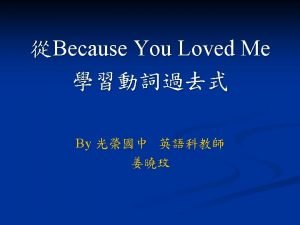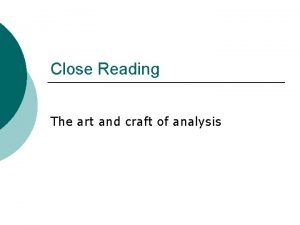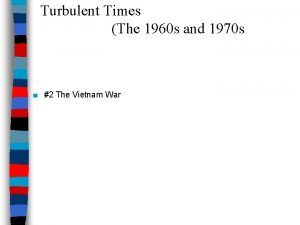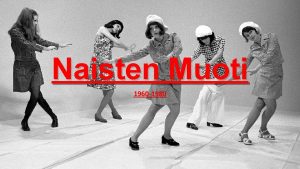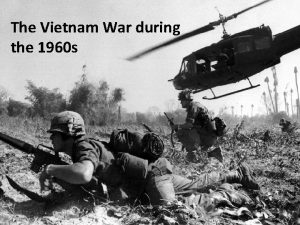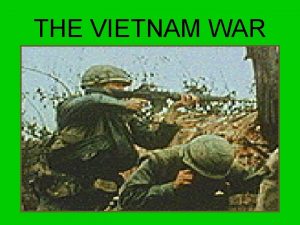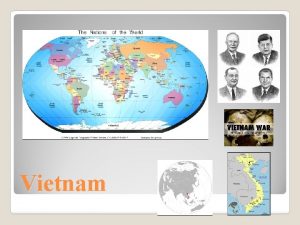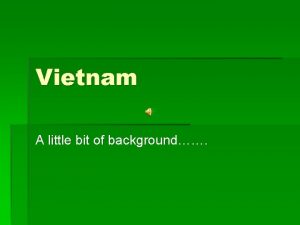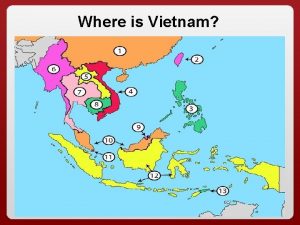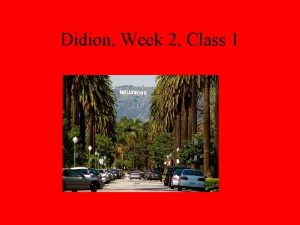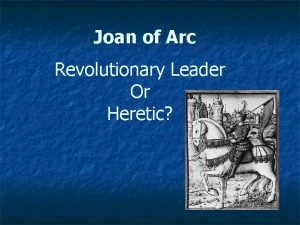Joan Didion and the 1960 s Vietnam and


















- Slides: 18

Joan Didion and the 1960 s Vietnam and Civil Rights New Journalism Mimesis and Simulation

Bare 1960 s Timeline [1950 s After Vietnamese defeat French colonial power, US starts aiding South Vietnam vs USSR & North Vietnam. Slow, long-term buildup of US forces. ] 1960 Student Nonviolence Coordinating Committee forms (key civil rights organization) 1963 Birmingham bombing & protests (MLK Jr) Civil Rights March on Washington (“I Have a Dream”) JFK assassinated 1964 Civil Rights Act (banned segregation and government agency discrimination) 1965 Malcom X assassinated Voting Rights Act (outlawed discriminatory voting practices) Grateful Dead form

1966 Diggers form in San Francisco (anarchist guerilla arts action) Crying of Lot 49 published Black Panthers form, SNCC accepts politically motivated violence 1967 Great Human Be-In Summer of Love “Slouching Towards Bethlehem” published 1968: MLK Jr (April 4), Robert Kennedy (June 5) assassinated Tet offensive (N. Vietnamese and Vietcong attack S. Vietnam on Tet (major holiday) ) My Lai massacre (U. S. soldiers slaughter hundreds of unarmed Vietnamese) Waves of riots in Europe and US (universities)



The New Journalism: 60 s & 70 s Thomas Wolfe co-edited an eponymous anthology in 1973 claiming 4 principles: Scenes instead of historical narrative Dialogue in full, not in excerpted quotes 3 rd person p. o. v. for character description Everyday details to describe characters’ lives Writers included Mailer, Didion, Hunter S. Thompson, Truman Capote, Robert Christgau, Terry Southern

More General characteristics Use fiction techniques to elucidate facts. Facts and fiction are similar (though not indistinguishable) The writer/reporter character/persona is part of the story Techniques of fiction change notion of objectivity without obliterating it Published in magazines, not newspapers (New Yorker, Atlantic Monthly, Harpers, etc. )

Legacies of New Journalism Creative and literary nonfiction as a flourishing genre (MFA programs!) Serious news in “literary” magazines like the New Yorker Seymor Hersch broke the My Lai massacre story, which changed the course of USA’s engagement in Vietnam, now a NY writer breaking White House foreign policy stories

Questions for Our Class Postmodern aesthetics blend fact and fiction as well as mimesis and artifice/simulation (inc. selfconscious reflexivity). Are New Journalism techniques part of the mimetic/realism tradition, the artifice/modernist one, or both? Does the new journalist author character change the author function? Compromise objectivity? What techniques best to represent these particular histories, the volatile 1960 s?

Joan Didion “Slouching Towards Bethlehem” Mimesis (history), Simulation (art & drugs), and the Authorial Subject

The Second Coming William Butler Yeats written 1919 published 1920 Turning and turning in the widening gyre The falcon cannot hear the falconer; Things fall apart; the centre cannot hold; Mere anarchy is loosed upon the world, The blood-dimmed tide is loosed, and everywhere The ceremony of innocence is drowned; The best lack all conviction, while the worst Are full of passionate intensity. Surely some revelation is at hand; Surely the Second Coming is at hand. The Second Coming! Hardly are those words out When a vast image out of Spiritus Mundi Troubles my sight: a waste of desert sand; A shape with lion body and the head of a man, A gaze blank and pitiless as the sun, Is moving its slow thighs, while all about it Wind shadows of the indignant desert birds. The darkness drops again but now I know That twenty centuries of stony sleep Were vexed to nightmare by a rocking cradle, And what rough beast, its hour come round at last, Slouches towards Bethlehem to be born?

The New Journalist as Author My only advantage as a reporter is that I am so physically small, so temperamentally unobtrusive, and so neurotically inarticulate that people tend to forget that my presence runs counter to their best interests. And it always does. That is one last thing to remember: writers are always selling somebody out. (xiv)

More. Joan Didion as “I” “Time passes and I lose thread and when I pick it up again Max seems to be talking about what a beautiful thing it is the way Sharon washes dishes” (96). “Whenever I hear about the woman’s trip, which is often, I think a lot about nothin’-says’lovin’like-something-from-the-oven and the Feminine Mystique and how it is possible for people to be the unconscious instruments of values they would strenuously reject on a conscious level, but I do not mention this to Barbara. ” (113)

History & Mimesis All that seemed clear was that at some point we had aborted ourselves and butchered the job, and because nothing else seemed so relevant I decided to go to San Francisco was where the missing children were gathering and calling themselves ‘hippies. ’” (85)

The center was not holding. It was a country of bankruptcy notices and public-auction announcements and commonplace reports of casual killings and misplaced children and abandoned homes and vandals who misspelled even the fourletter words they scrawled. It was a country in which families routinely disappeared, trailing bad checks and repossession papers. Adolescents drifted from city to torn city, sloughing off both the past and the future as snakes shed their skins, children who were never taught and would never now learn the games that had held society together. (84)

At the time I was in San Francisco the political potential of what was then called the movement was just becoming clear. It had always been clear to the revolutionary core of the Diggers, whose every guerilla talent was now bent toward open confrontations and the creation of a summer emergency, . . . and it could rapidly become clear to any outsider who bothered to decode Chester Anderson’s call-to-action communiqués. . But the particular beauty of this political potential, as far as the activists were concerned, was that it remained not clear at all to most of the inhabitants of the District. (121)

Race in the Summer of Love Peter Berg is saying if anybody asks that this is street theater, and I figure the curtain is up because what they are doing right now is jabbing the Negro with the nightsticks. They jab, and they bare their teeth, and they rock on the balls of their feet and they wait…. ‘What’d America ever do for you? ’ the girl in blackface jeers…. ‘Listen, ’ the Negro says, his voice rising. ‘You’re gonna start something here, this isn’t right—’ ‘You tell us what’s right, black boy, ’ the girl says. ” (126)

Once we had seen these children, we could no longer overlook the vacuum, no longer pretend that the society’s atomization could be reversed. . At some point between 1945 and 1967 we had somehow neglected to tell these children the rules of the game we happened to be playing. . Because they do not believe in words—words are for ‘typeheads, ’ Chester Anderson tells them, and a thought which needs words is just one more of those ego trips—their only proficient vocabulary is in society’s platitudes. As it happens I am still committed to the idea that the ability to think for one’s self depends upon one’s mastery of the language, and I am not optimistic. [They are] an army of children waiting to be given the words. (123)
 Joan didion vietnam
Joan didion vietnam Joan didion up close and personal
Joan didion up close and personal Analyze the
Analyze the Vietnam war 1960
Vietnam war 1960 Hát kết hợp bộ gõ cơ thể
Hát kết hợp bộ gõ cơ thể Frameset trong html5
Frameset trong html5 Bổ thể
Bổ thể Tỉ lệ cơ thể trẻ em
Tỉ lệ cơ thể trẻ em Voi kéo gỗ như thế nào
Voi kéo gỗ như thế nào Chụp tư thế worms-breton
Chụp tư thế worms-breton Hát lên người ơi
Hát lên người ơi Kể tên các môn thể thao
Kể tên các môn thể thao Thế nào là hệ số cao nhất
Thế nào là hệ số cao nhất Các châu lục và đại dương trên thế giới
Các châu lục và đại dương trên thế giới Công thức tiính động năng
Công thức tiính động năng Trời xanh đây là của chúng ta thể thơ
Trời xanh đây là của chúng ta thể thơ Mật thư anh em như thể tay chân
Mật thư anh em như thể tay chân 101012 bằng
101012 bằng Phản ứng thế ankan
Phản ứng thế ankan

